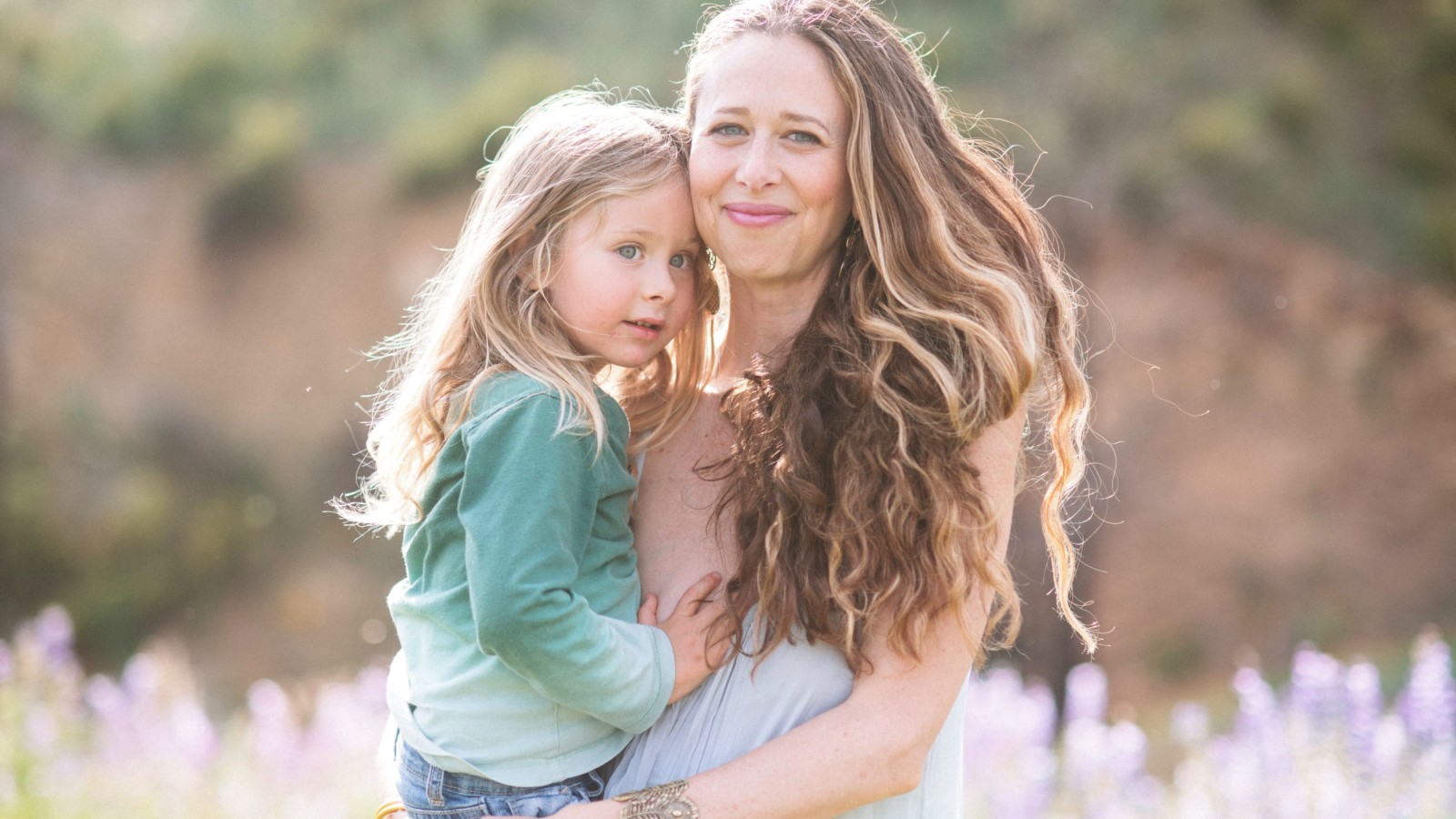Tabby Biddle speaks with Ameya Cohen, the founder of the Woman Rising Mystery School, about her mission to support women to remember and reclaim themselves and awaken the grace of the Great Mystery that resides within.
Over the last two decades, Ameya Cohen has been using her extensive training in the Mystical Arts of Shamanic Studies, Flower Essences, Moon Wisdom, and her Priestess Path to guide and support women to remember and reclaim themselves, and awaken the grace of the Great Mystery that resides within.
In 2017, Ameya founded the Woman Rising Mystery School, where she offers online and in-person programs and trainings, including Priestesses of the Rose and the Woman Rising Flower Essence Certification Program, as well as pilgrimages to Sacred Feminine sites, like Avalon, Ameya’s Priestess home. All of her programs are steeped in both mystical and practical wisdom to support women to thrive in their lives and their activism.
Ameya’s students call her “a true embodiment of a Divine Feminine leader” who lives in deep relationship with plants and the larger web of life on Earth. Ameya is best known for the sacred space she holds, the sisterhood communities she creates, and the compassionate sharing of wisdom that passes back through the ages. Ameya lives in Southern California with her partner and son.
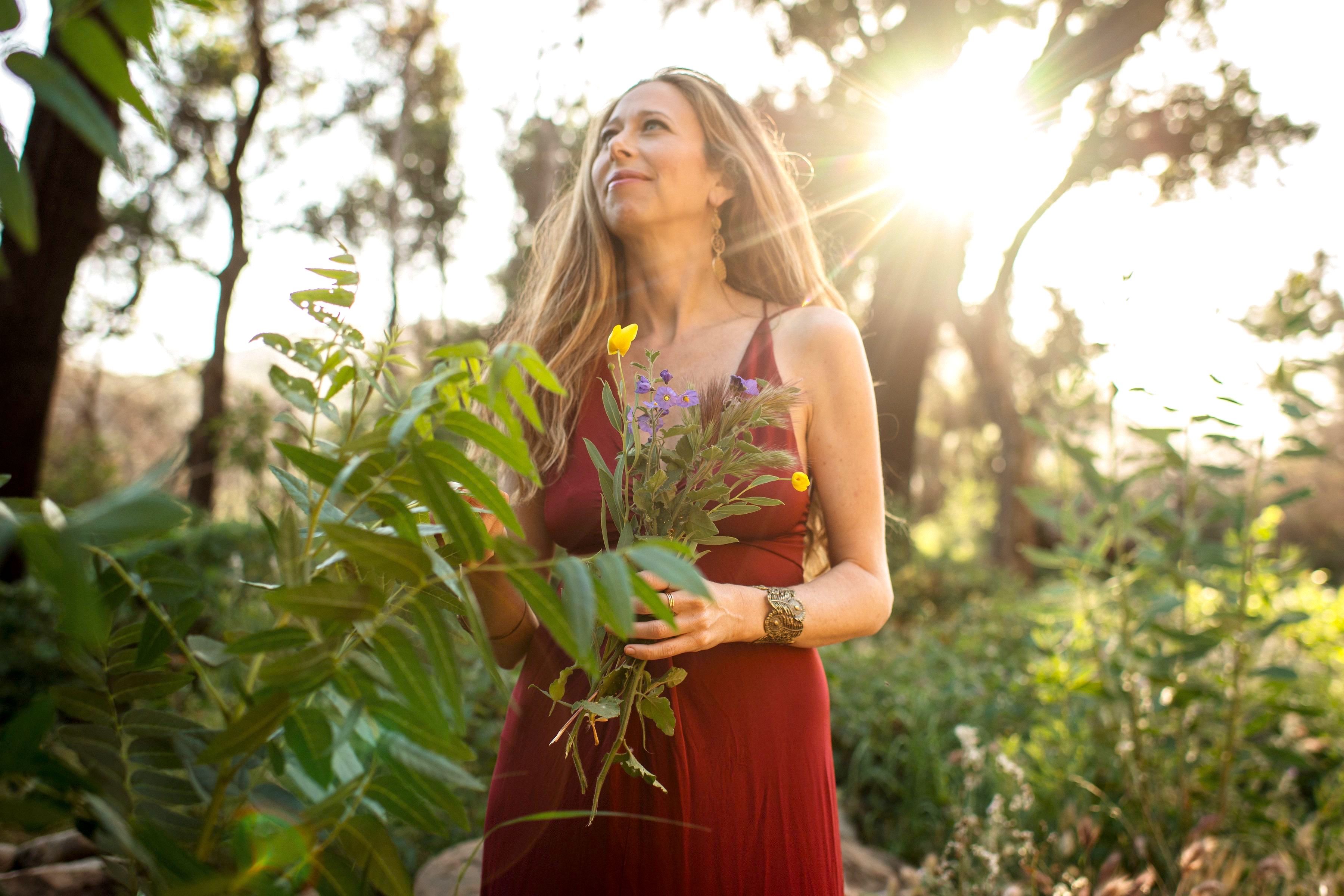
Tabby: As you well know, so many women’s voices and stories have been omitted from our history books, and therefore our knowledge. So, I want to start with your voice. You use your voice in so many different ways — through leading circles, teaching, speaking, writing, through the Flower Essences, leading pilgrimages to Sacred Feminine sites, and more. How would you describe where you are right now with your voice?
Ameya: For some reason, I have tears. Something is impacting me deeply with that question about the potency of the voice as women, and the years that it takes to embrace that, at least for myself, my own process. I believe I’m on an ever-evolving journey. Where I am now is really different than where I was five years ago, or 10 years ago; and where I will be in five years or 10 years from now. The place of really embracing my voice has so many layers. There’s the verbal oratory part of the true voice, the true somatic voice. Then there’s the layer of trusting that what I have to say with my voice is important or essential to either myself or those that I serve. I’m in a place right now of coming into and being in trust with those two layers — the trueness of the audible voice, and that what I’m saying feels important for this time — the trajectory of the human existence that we’re experiencing right now.
Tabby: Where do you feel the most powerful and natural using your voice?
Ameya: For sure, when I’m teaching. When I’m teaching about Flower Essences. When I’m teaching about Trauma-Informed Healing. When I’m teaching about the Remembrance of the Priestess Path. I feel I’ve arrived, as if this is part of my destiny. This is part of my dharma. This is the place that I truly shine and the place where I allow all parts of women to be present, and to create a safe space for that. I also love writing. The reach of writing is different than those I’m teaching, who have signed up for a program. But where I feel my most natural is teaching and sharing from the realness of my own journey, from the realness of supporting other women, from the realness of my connection to the Earth. That’s my place of total comfort.
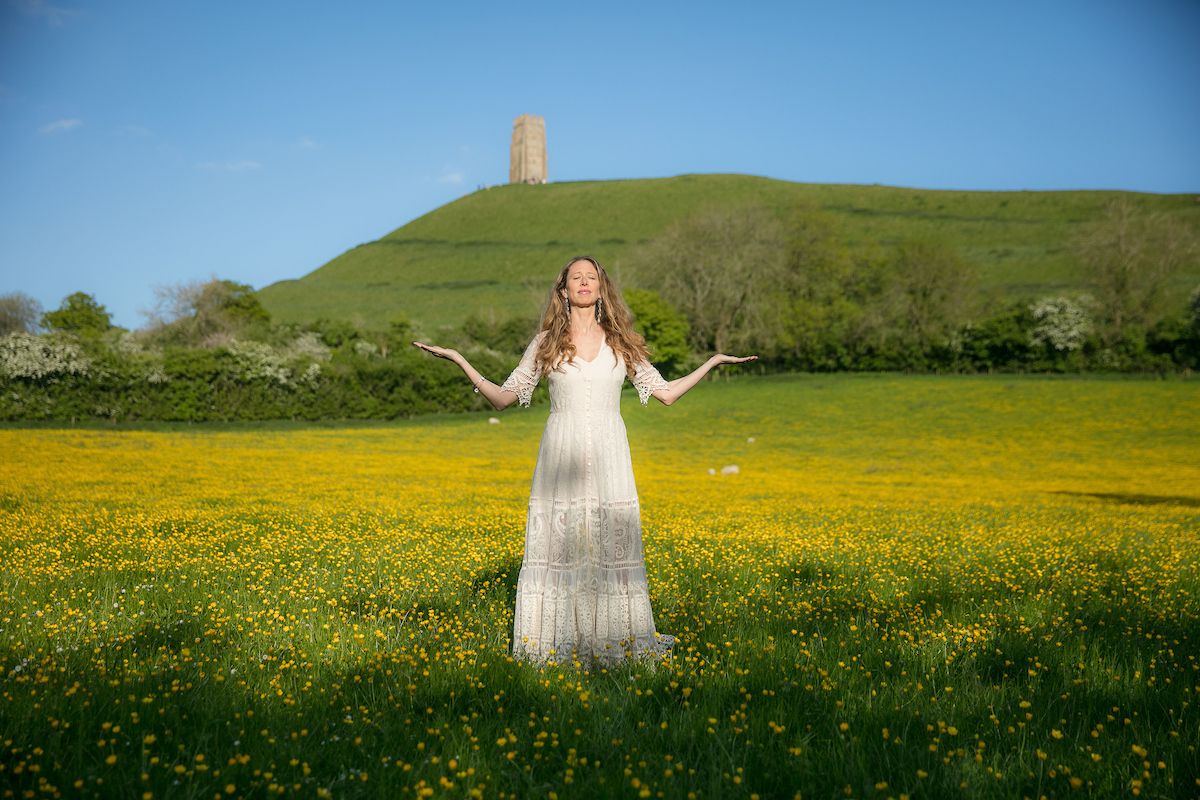
Tabby: Let’s talk about your leadership. For so long, leadership has been defined by the male lens, the male standard and male values. This doesn’t work for most women. Your Woman Rising Mystery School helps women lead their life and lead others in a whole different way. Tell me more about this.
Ameya: I think leadership, especially for women, is such a massive journey. There’s the dismantling of what we’ve been taught or projected onto us, while also then having our own healing journey of coming into a place of how we fit into the fabric of existence, and then into leadership. The redefining of that is so powerful, because it’s not just leadership of, “I’m in power in government.” It’s leadership in your home, in your body, in your finances, in your devotional path. Leadership is so much more complex than just that “power over” that we’ve been taught. So, for me, and what I do, that place of finding leadership has to come from the healing of our wounds, and the repair of traumas, because there’s just so much illusory aspects that we have chosen to believe at different times of our lives that have to be redefined, released, and restored into wholeness to come into that place of feeling resourced enough that you are embodied enough, that you can take the lead in some capacity. It’s a huge shift for us to understand, and to create something new. It is this whole idea of “power with” — relational experiences within this greater context of leadership, instead of the “power over” — the hierarchal experience that’s so embedded in our culture. I could go on and on.
Tabby: I know this is a big topic.
Ameya: I want to add one thing that feels important. You and I spoke about this years ago. There are people coming into this path who want to deepen with the Earth, or who want to deepen on their spiritual path. There’s also a place when they’re working on themselves, where they realize the values that they hold. Then their values become the pathway for their activism in the world. Whether it’s for the Earth, or for children, or for, gosh, there’s so many different ways that we can be active in the world to be a voice for those that don’t have the voice. I feel it’s important to talk about leadership also being this political and social experience, that can still be rooted in the Earth, and in your spiritual path and your practice. They’re not separate. It’s not like leadership is only for the political person. Your values and what you believe to be true are political.
“I feel it’s important to talk about leadership also being this political and social experience, that can still be rooted in the Earth, and in your spiritual path and your practice. They’re not separate.”
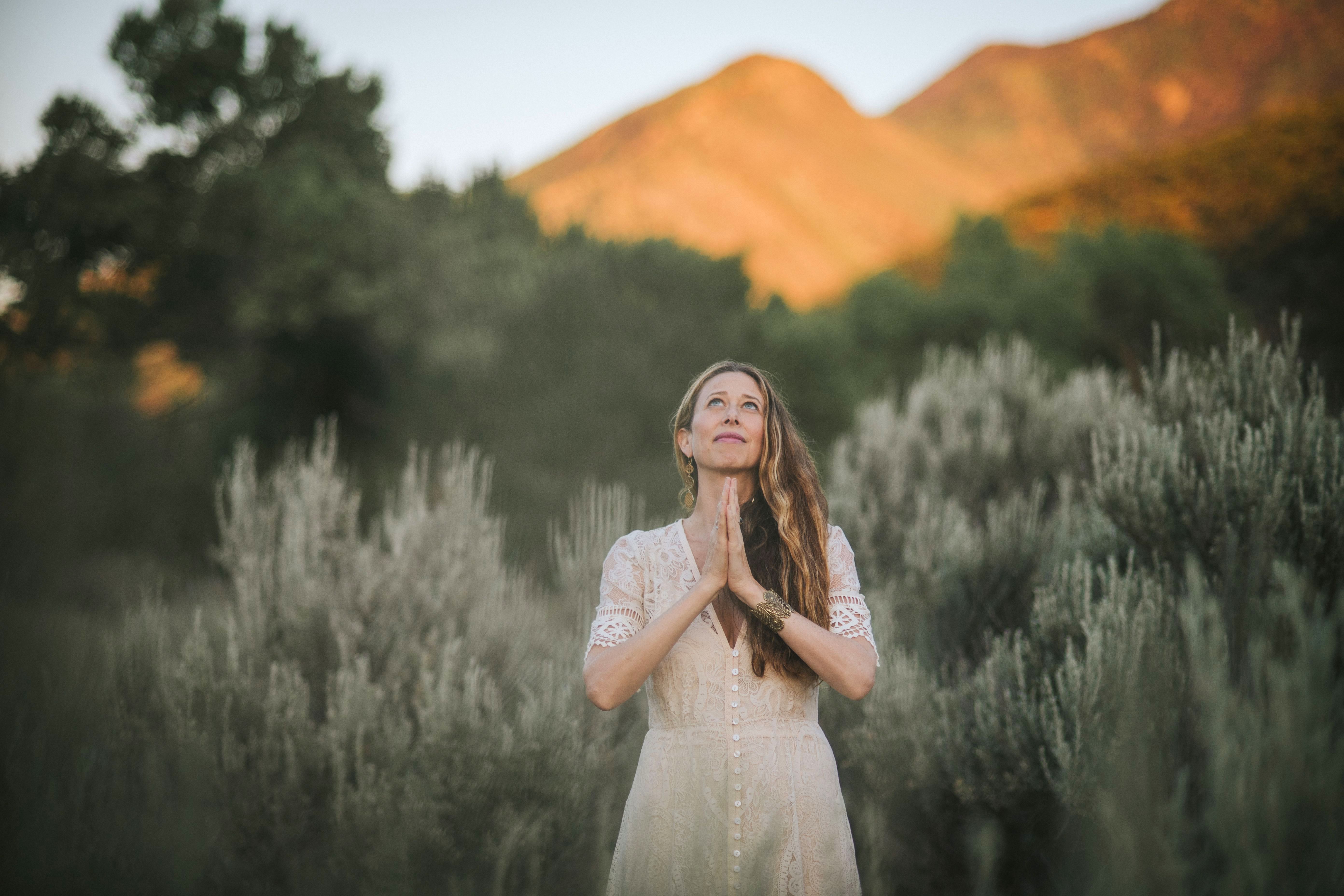
Tabby: I absolutely agree. I’m so glad you brought this into the conversation. What do you value in leadership, and how would you describe yourself as a leader?
Ameya: My deepest value is relationship — being in relationship with myself and with others. That’s when I know I’m in my place of essence and integrity. That’s what I try to cultivate any time I teach or share or write. Relationship and relatability. One of my core values is generosity. I often ask myself, “How can I push through any edge that I have where I want to hold tight, or where I don’t want to disclose, and just be generous with my own life experience, with my own ideals, with my own faults, with my own everything?” That’s a big change from what we have seen in the world up to this point of kind of distancing ourselves from relationship or relatability. But I’m just the happiest when I’m in relationship with my students, or really, anyone. Anyone in the world. I’ve had a connection, and I feel that person, and I know that they have, hopefully, felt me. That’s the place for me that I’m always looking to experience.
Tabby: When we spoke about your voice earlier, you shared that teaching is where you feel the most natural and powerful. I’m curious, is teaching also where you feel the most powerful and natural leading?
Ameya: It’s an interesting question. I’m in a big inquiry and process right now, which is that in the patriarchal paradigm, what we’ve been taught is this: Let’s say you’re taking a course, you pay for the course, you show up for the course, that teacher teaches you and you take what they have. You listen, but it’s really about this taking from the teacher, because there’s been a financial exchange. One of the things that I’ve been realizing over the years is that that doesn’t always feel great for me, because I want to be in relationships. So yes, there’s a financial exchange, and I’m going to teach, and I also want that person to step forward. I also want to learn and hear and be in co-creation, in that specific container of a program, with that person.
“I’ve really wanted to create a shift around this idea of the teacher being ‘above’ because it doesn’t feel as relational as I want to experience.”
I’m looking at: Where can I open space for this woman to step forward and shine that feels like greater leadership to me than just standing up on a podium and teaching? It’s like giving opportunity for them to receive, because then they give opportunity for another woman to step up. It’s a different way of being, and I’m trying to figure out how do I run online programs, and shift some of these deeper, more intricate, hard-to-express paradigms that we’ve been living in.
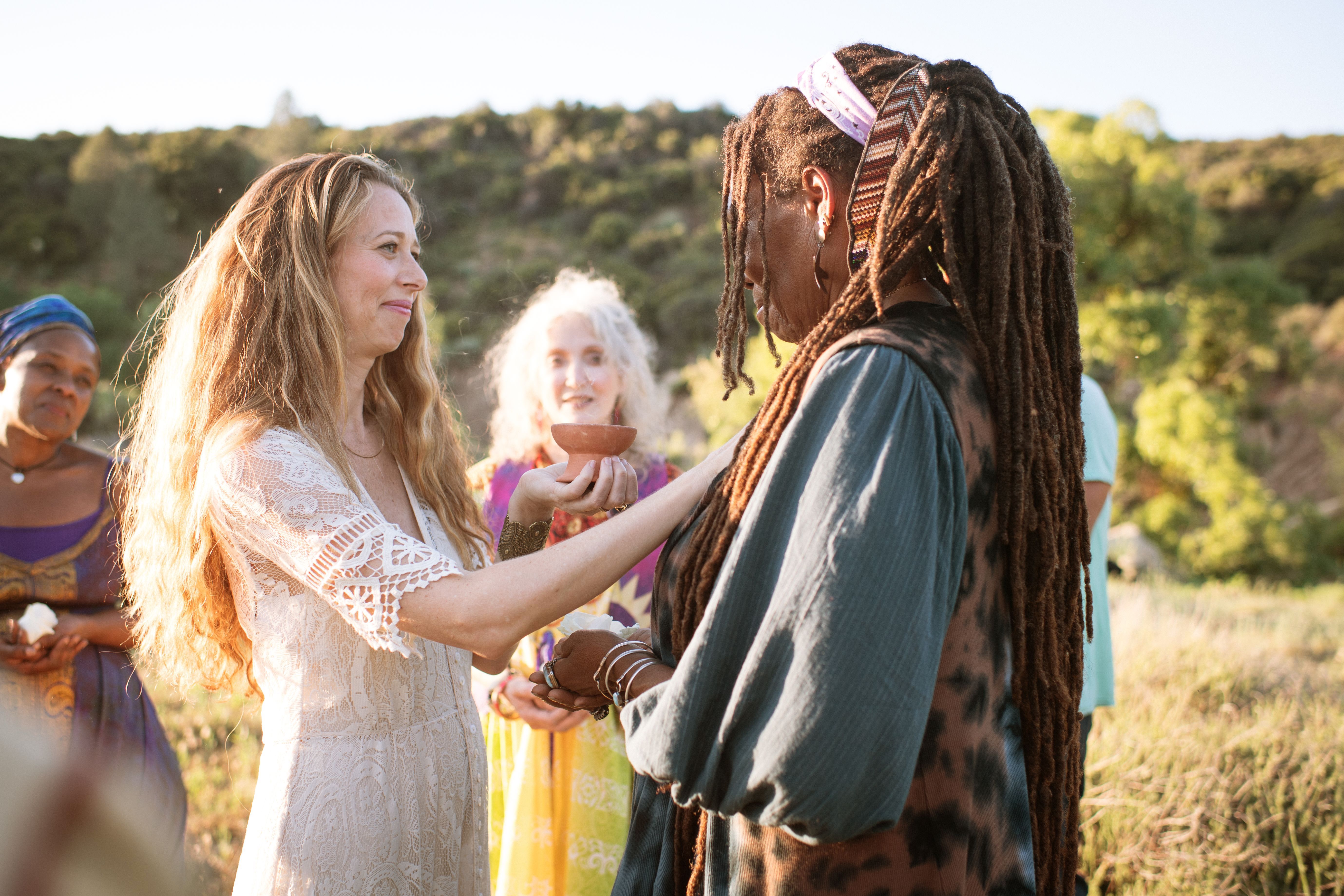
Tabby: I get that.
Ameya: I’m imagining it comes from white privilege. I’ve given money. I’m showing up and I’m taking. Where can that be changed so that teachers and leaders don’t feel like they’re just being pulled for information, and there’s actually a relational experience happening?
Tabby: Speaking of teaching, you’re just wrapping up a year of teaching and leading a program called Priestesses of the Rose. What is the program focus, and what do participants come away with?
Ameya: Priestesses of the Rose is a deep journey of your own devotional path, and what it means to be a Priestess. That is a massive exploration because, in 2021, there is no one definition. Priestessing may be as a CEO. Priestessing may be running a nonprofit. Priestessing may be Mothering. Priestessesing may be being a beekeeper. It’s more about understanding what your devotions are tapped into, and learning to remember the truest essence of who you are, free from conditionings, free from as much as we can, our past wounds and hurts and traumas. I co-facilitate this program with a dear sister of mine.
We go through an entire year. Or in Celtic tradition, the Wheel of the Year, celebrating the eight high holy days, because you learn about yourself through the rhythms that the Earth is moving and navigating. Then in each of these seasons, we have different guides — Rosa Mystica Guides, Ascended Masters and teachers who are speaking and teaching about specific mystical curriculums that have been protected and guarded and kept safe for thousands of years. Women are waking up to them now and are thirsty and hungry for them. We’re seeing so many women having these experiences with Mary Magdalene or Mother Mary. They say, “They’re talking to me, they’re coming to me in dreams.” We’re these seeds of light who are awakening to a consciousness, that’s been divinely orchestrated that we would be awakening to at this time because of what’s happening, and what’s needed here. The deeper our devotions are, I think the more graceful and peaceful we move through the chaos, and the uncertainty that we are and will continue to experience for some time.
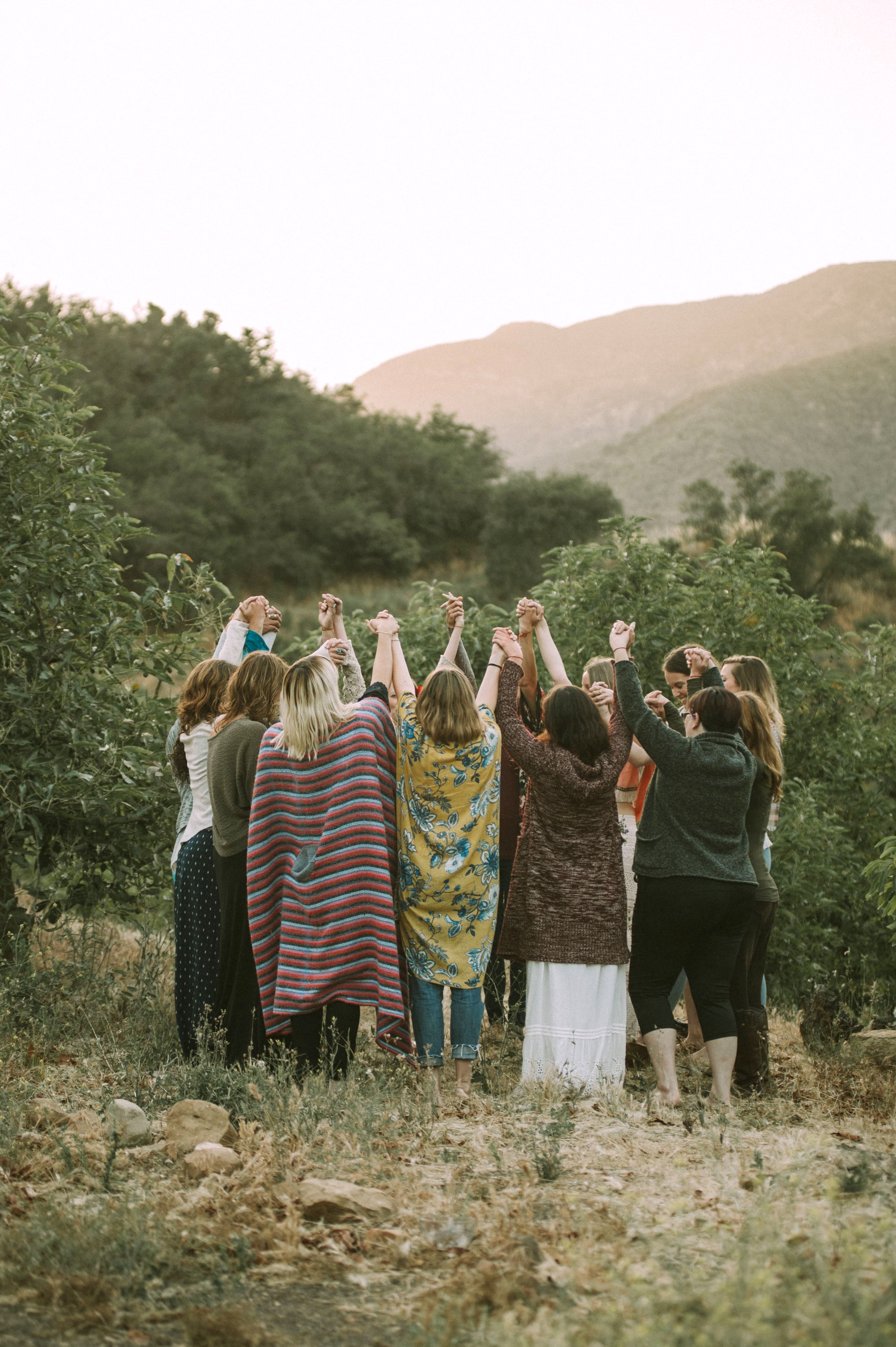
Ameya: As far as what women receive… some women realize they’re ready to leave their partners. Some women realize they want to renew their marriage vows. Some women stop drinking. Some women become artists and have their art shown in studios across the country. Some women realize their dreams. We have women who have started schools for children. Women who have started their healing practices. It’s any and all. It’s really an experience of listening and allowing soul to come forth through your specific frequency, not anyone else’s. There’s a freedom to this path. This experience doesn’t look like anyone else’s, which is uncomfortable for many women, but liberating.
Tabby: I find the work that you do with Flower Essences fascinating, especially as it relates to healing trauma. You spoke about trauma earlier. How has your work with Flower Essences evolved over time?
Ameya: Flower Essences have saved me. And I don’t say that lightly. They have shaped so much of who I am — the way that I live, the way that I think, the way that I be, the way that I teach, and the way that I lead. They’ve helped me slough off so many aspects that I once thought always had to be who I was, that really were never who I was. I feel so knowing in their strengths and their miracles. Having worked with them for 20 years, I am very clear about the enormity of this healing modality, and even more devoted to getting this information out into the world in a very clear and very grounded way. Having assisted so many women through the years, I’m just more confident. I think that’s the piece around leadership and voice that feels important to presence too. We’re in such a rush in our 20s, even in our 30s, to be where we want to be. But it’s such an embodied experience that we have to live through. Into our 40s and 50s, we just get more and more knowledgeable and wise and have more years of partnership with whatever it is that we’re aligned with that we love. And so Flower Essences are a huge part of my legacy, for sure.
Having a child, I’m always wondering how that then gets picked up by him, and will it continue. It’s such a profound and much needed healing modality right now. Especially through 2020, people have really turned back towards the Earth. Gardening exploded, people are making sourdough bread and beekeeping. Turning to the Earth and having safe and effective medicines for emotional health and mental health — I just can’t think of anything much greater right now in the world that we’re living in.
“Flower Essences have saved me. And I don’t say that lightly. They have shaped so much of who I am — the way that I live, the way that I think, the way that I be, the way that I teach, and the way that I lead.”
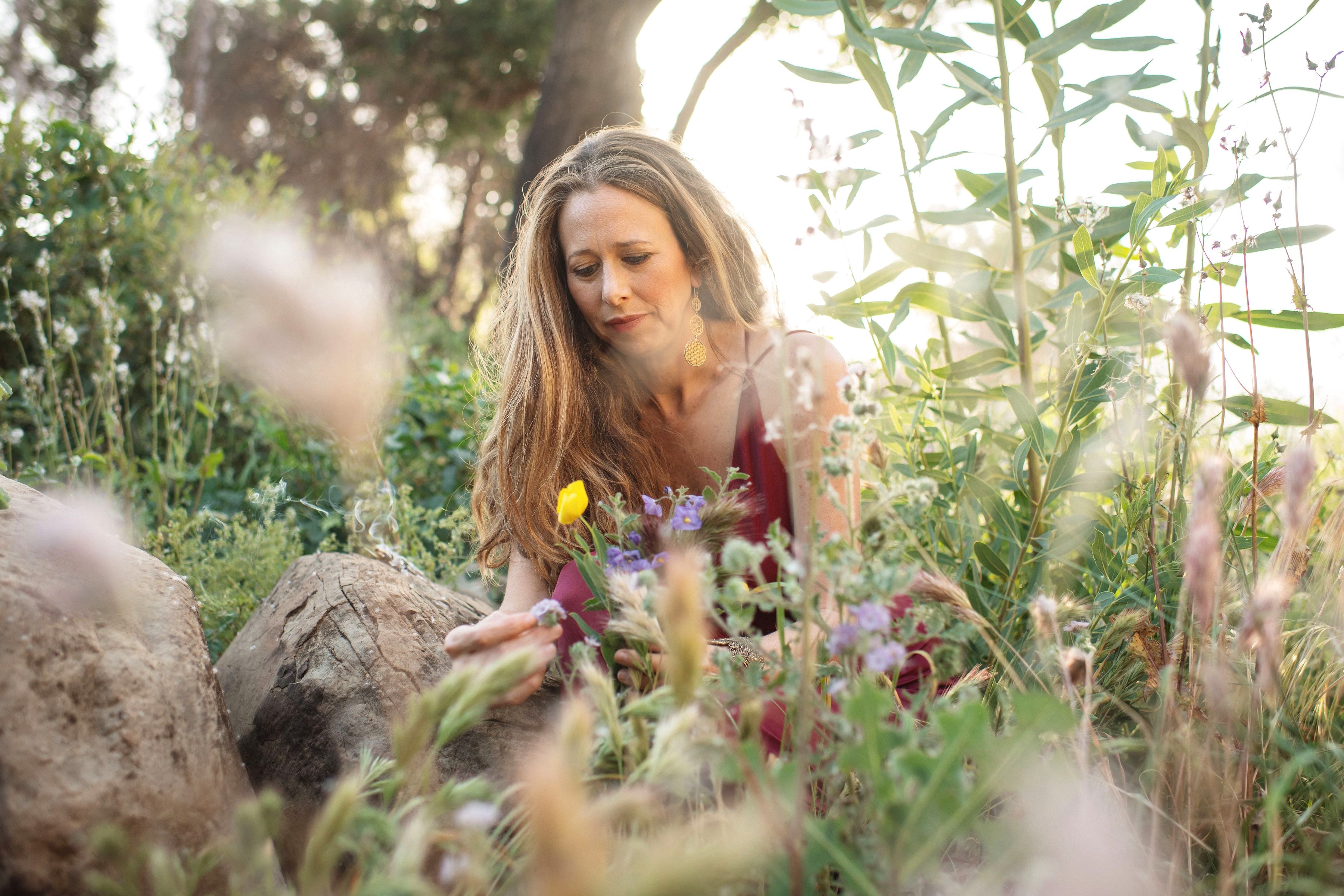
Tabby: You spoke about legacy, which I want to speak more about. When you tune into your greatest feminine legacy that you’re here to create and leave for upcoming generations, what do you see?
Ameya: My first thought goes to my child. Then my second thought is work. Of course, they’re combined. But being in partnership with the Earth — deep reverence and respect — feels to me like one of the most essential ways of being right now at such a precipice of what is happening with climate justice and climate change and resources. I would take my last breath, if I knew that I had impacted one or more people to love and deeply honor, and be in partnership with the Earth. I would take my last breath feeling so complete.
The next layer is having women really take self-responsibility for themselves and see themselves as powerful, truthful, and wise. And that they are really needed. Their existence is here for a purpose, and for them to fulfill their own destiny. That feels very fulfilling to me and feels that I’ve served in some capacity.
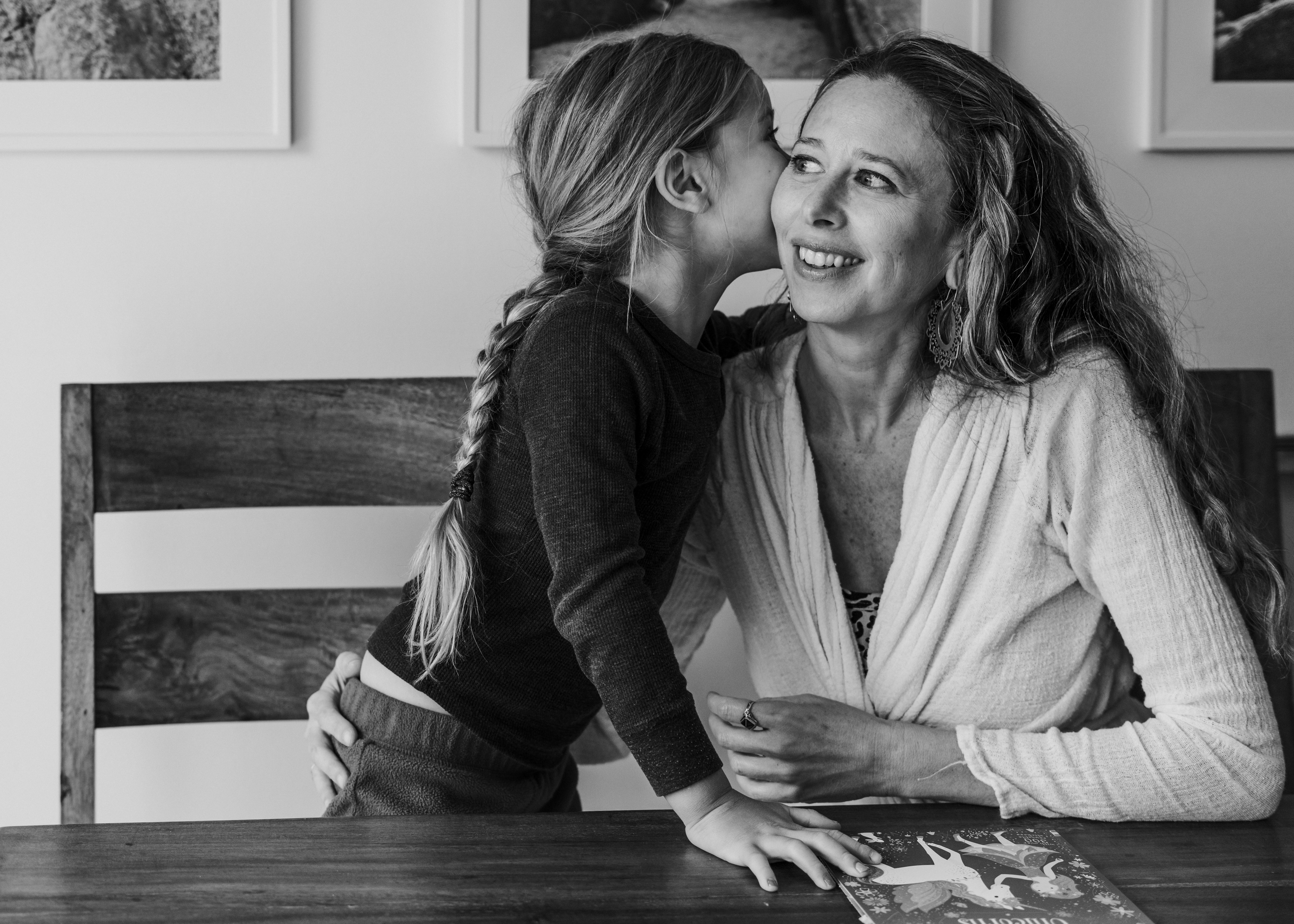
Tabby: We spoke earlier about how so many female voices, stories, accomplishments and life experiences have been omitted from history books. For this reason, many of us have little record of our female ancestors and lineage. But your work actually seems to be steeped in female lineage. I’m curious, what do you know about your female lineage? And how have you learned about it?
Ameya: On my mom’s side — my maternal, feminine side — we’re all entrepreneurs. They were European, hard workers, and either worked in the fields, or were medicine people or, had shops and stores in the 20th century. I’ve always been an entrepreneur. I’ve always worked for myself. I’ve never had another job. It wasn’t even part of my consciousness to go work for somebody else. I didn’t realize that until I started asking my Grandma when she was still alive and looking into my own ancestry. So that’s been verbal conversations. But then also with Flower Essences, there are ways that you can work with them to kind of cross the veils and connect with the unseen realms and tune into way back generations of ancestors. It’s so wild to think of a thousand years before. I’ve done healing on my lineage. Like, Where do some of these beliefs that I’ve been carrying around come from? I’m going to give it back to that person who really is the source of this.
My dad’s maternal line is not as known. That’s where I’ve used some of these more spiritual aspects to connect with beings that I don’t know their names. I’ve joined them as they’ve sat around fires in the liminal realms and gotten to know some of them. There is a lot of trauma on that line that I’ve gotten intimate with. They’ve all had such unique lives at different times on this planet. I’ve wanted to know them and their stories.
Tabby: What would be your advice to women who want to expand the reach of their integration of spirituality, social and political change? How can they grow their impact?
Ameya: I think there are two things. First, find people who are bridging those areas. Find people who inspire you in that work to be in a greater expansion of your leadership and your activism. You were one of those people for me. I can remember times where just sitting and listening to you and listening to your understanding of political, with your deeply anchored spiritual path, was really inspiring and eye-opening for me. I had really pushed aside being political, because of what I experienced from our political system. I didn’t want anything to do with that. But in actuality, what I am doing is social and political.
Then, second, I think there’s the deeper piece of realizing or remembering, that we’re human beings living on this shared planet, and everything is political and everything social, from what we buy to what we eat, to how we engage with people, to our work in the world. It’s all part of that. That’s a huge piece of the way that our world continues to transform through social movements, through political movements. They’re fed by whoever is involved in those movements. So, everything becomes part of that. I think when we have that realization, we make huge impact.
“Seeing people who were spiritual, being political, really opened my mind to the possibility that they actually do merge. I think we’re seeing that more and more. Like Amanda Gorman and her poem. That was the most spectacular thing in the world.”
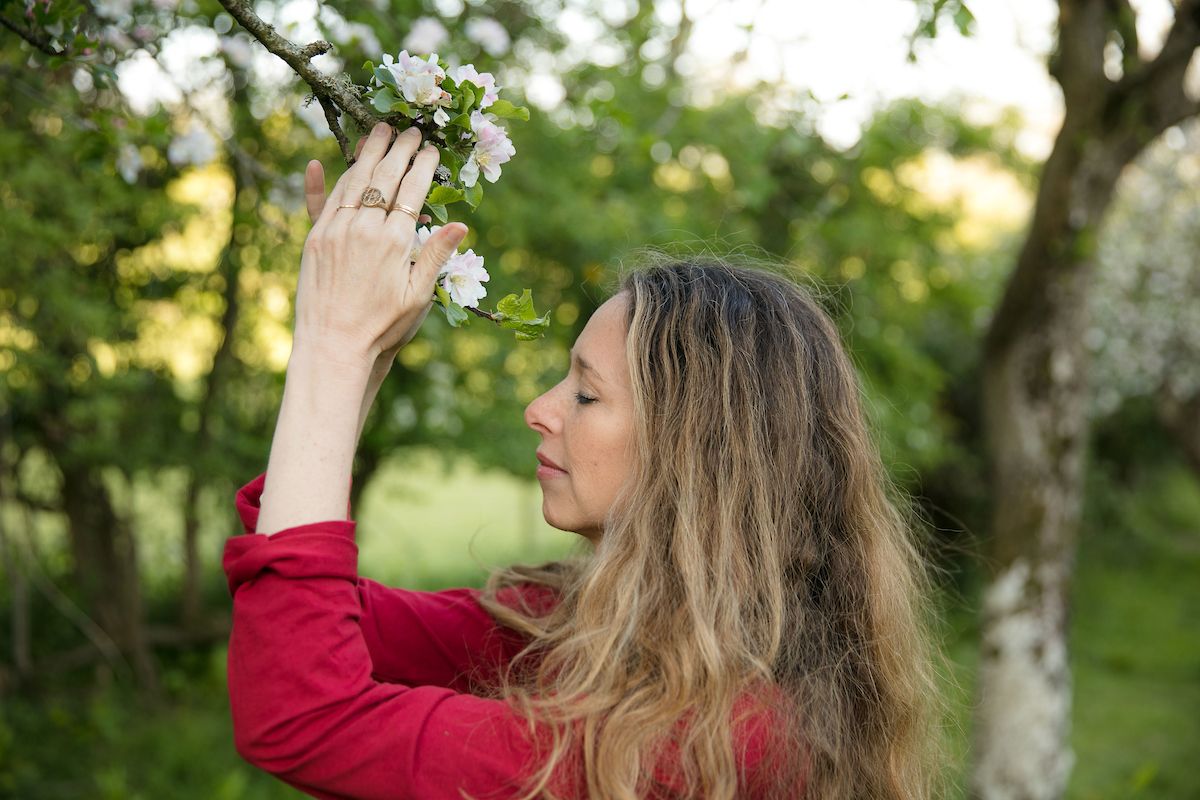
Tabby: If you had a loudspeaker that could reach the ears, hearts, minds and souls of women and girls around the world, what’s the message that you’d want to impart?
Ameya: The first thing I would say is for the women and girls who don’t have a voice, and who don’t have layers of leadership, let us be that for you. And then I’d turn to those that do have the voice and say, If we can’t do this for ourselves, we have to do it for those who cannot or who don’t have the access that we have. That feels first and foremost, because that question is really related to people who do have the capacity to use our voice. Find something that speaks to you. Find something that moves you deeply and spend time putting energy towards co-creating or dreaming or rooting something more into this consciousness, whatever that is.
The other thing that’s coming up is letting women know that they belong. And there’s a place for them. And please take your Flower Essences. Stop normalizing suffering.
Tabby: Are there any last thoughts you want to share with the readers that I might not have touched on?
Ameya: A reminder for all of us that we’re doing this together. We need each of us to be here, doing our own part of the greater whole. That unique frequency of all of us, is so important for what then transpires and transforms in the world.
I believe sisterhood and places of community are of utmost importance, because we will all go through times where we doubt ourselves, or we forget the truth of who we are, and to have supportive groups or people around us who are rooting for our victories because your victory is my victory feels essential for this conversation.
Tabby: Absolutely.
Ameya: This conversation is making me really hopeful for the future of our planet and the future of what will be created when we all are choosing to be part of a greater creation, experience, and movement for justice and equality and love. We’re all learning. We’re all bettering ourselves. Find people and have ways to resource yourself within that. Even if it’s for two minutes or five minutes a day.
Learn more about Ameya Cohen’s Woman Rising Mystery School.
This interview first appeared on tabbybiddle.com.
Tabby Biddle, M.S. Ed. works at the intersection of women’s leadership, feminine spirituality and social change. She is the co-founder of 50 Women Can Change the World in Media & Entertainment, the bestselling author of Find Your Voice: A Woman’s Call to Action, and an internationally celebrated women’s leadership coach, educator, strategist, and group facilitator for her unique approach to activating women’s leadership. Learn more.


